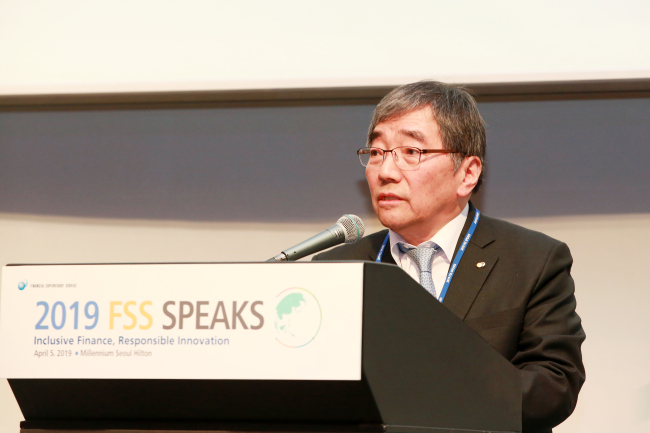The chief of South Korea’s financial supervisory body on Friday stressed “inclusive finance” and “responsible innovation” as the key drivers of its regulatory oversight this year as the country prepares for explosive growth in the fintech sector.
Financial Supervisory Service Gov. Yoon Suk-heun called on foreign financial firms here to “bring in a new wave of financial inclusion and responsible innovation to the Korean financial industry.”
Yoon was speaking at “FSS Speaks 2019,” an annual forum hosted by the FSS in Seoul to foster dialogue and understanding between the supervisory agency and foreign financial firms operating in Korea.
 |
Financial Supervisory Service Gov. Yoon Suk-heun speaks at the "FSS Speaks 2019" forum held at the Grand Hilton Seoul on Friday. (Financial Supervisory Service) |
According to the FSS chief, “inclusive finance” should center on increasing the financial accessibility of marginalized financial consumers, while “responsible innovation” means keeping sight of the risks and unexpected consumer damage that can result from new forms of financial services, he said.
Korea’s “regulatory sandbox” policy for the finance sector went into effect this week, providing wider latitude for local and foreign firms seeking to launch new fintech innovations in Korea.
A regulatory sandbox is a mechanism for the development of regulations that do not unduly slow down the pace of innovation. Current regulations could be temporarily suspended for new forms of financial services while they are being tested in the market.
While keeping basic safeguards in place, new regulations would be drawn up later, once it became clear what kinds of regulations were appropriate and reasonable.
The policy came into effect as part of the Special Act on Financial Innovation Support, which passed in the National Assembly in November and formally went into effect Monday.
While paving the way for new fintech services that promise to improve efficiency and productivity in the financial industry, the FSS will simultaneously do its part to manage the new risks that will inevitability emerge, such as data security or regulatory arbitrage.
Other key tasks for the financial supervisor include engagement in the legislation process on peer-to-peer lending and creating an environment conducive to the application of blockchain technology in the financial sector.
Creating a comprehensive and systematic off-site monitoring framework for fintech services and facilitating the growth of “regtech” -- the use of technology, such as big data and cloud computing, to better manage regulatory compliance -- are also big priorities for the FSS.
Moreover, the financial supervisor pledged to continue running its Fintech Advisory Service program, launched in May 2017, which assists fintech startups on regulatory issues, including internal controls.
As of now, the Financial Services Commission -- the financial regulator that sits above the FSS -- has selected 19 fintech services for “priority review” for inclusion in the regulatory sandbox.
The envisioned services span diverse categories including loans (five), insurance (two), capital markets (three), earnings and credit (three), banking (two) data (two) digital finance (one) and peer-to-peer loans (one).
The FSC plans to announce its decision on the 19 services within this month. The commission will also accept fresh applications for inclusion in the sandbox scheme in June.
By Sohn Ji-young (
jys@heraldcorp.com)








![[Weekender] Korea's traditional sauce culture gains global recognition](http://res.heraldm.com/phpwas/restmb_idxmake.php?idx=644&simg=/content/image/2024/11/21/20241121050153_0.jpg)